50th Northeast Bioengineering Conference


You may submit your abstract until the deadline: February 16, 2024, 11:59 PM EST (extended).
NEBEC is accepting abstracts for:
All authors must submit their abstract electronically using the button at the very bottom of this page. This portal is the ONLY option for submission for all categories.
Abstract Templates:
To download a Scientific Research abstract template with content guidelines: CLICK HERE.
To download a Senior Design Poster abstract with content guidelines: CLICK HERE.
To download a Faculty Innovator abstract with content guidelines: CLICK HERE.
Abstract Requirements:
Title
The title should be brief, clearly indicating the nature of the presentation. When entering your title online, use mixed case (do not use all caps), and do not put a period at the end of the title.
Abstract Disclosure Statement
For colleagues to properly evaluate the information, analysis, and opinions presented in your abstract, they must be informed of potential conflicts of interest pertinent to the research submitted. Therefore, all authors must provide any relevant information concerning personal or professional circumstances and relationships that might reasonably be expected to affect the author’s view on the subject. Examples include but are not limited to:
Disclosure information is collected on the online abstract form. Appropriate disclosure will be stated in the scientific program and the abstract volume. If you have nothing to disclose, you must indicate this on the online abstract submission form. The disclosure information you provide will not influence the review of your abstract. Abstracts will not be reviewed without adequately completing the conflict of interest/disclosure section on the abstract submission form. Disclosure information for all authors is required upon abstract submission.
Acknowledgment of Receipt of Abstracts
Once your abstract has been completed, the submitting author will receive an e-mail acknowledgment.
Abstract Revisions or Withdrawals
If the submitted abstract must be revised or withdrawn, we must be notified in writing via e-mail nebec24@stevens.edu
Submit only ONE abstract for each presentation; DO NOT submit multiple copies of the same abstract, and DO NOT submit in masked format.
Registration Requirements
Presenting authors of accepted abstracts are expected to pay their conference registration fee(s).
Review Procedures
Submitted abstracts that substantially contribute to the biomedical engineering field and follow the published abstract submission instructions will be accepted by peer review. Reviewers will be selected by the Program Chair and Committee. Accepted abstracts that are not as well aligned with the session track suggested by the submitting author may be reassigned to another track.
Author Contact Responsibilities
It is the submitting author’s responsibility to ensure that all co-authors are listed on the submitted abstract. The person submitting the abstract identifies the author who will be designated as the presenting author. The presenting author will be the primary contact on the abstract moving forward. The presenter must be one of the co-authors listed on the submitted abstract. The presenting author will be the main point of contact for information regarding the submission and is responsible for the following:
Failure to Present
The presenting author is expected to present the paper. If emergencies at the time of the meeting prohibit the participation of the designated author, the chair(s) of the session and the Program Committee chair must be notified of the name of the replacement speaker before the meeting. The presenting author is primarily obligated to ensure that the abstract is presented.
Conference Award Recognitions
These awards aim to recognize the accomplishments and promise of early-stage researchers in Bioengineering-related fields. This conference initiative will provide meritorious young scientists from universities and research institutions in the greater Northeastern regions an opportunity to present their latest research results and draw wide attention to their work. Outstanding junior faculty, post-doctorates, graduate researchers, and senior undergraduates will be selected for awards and recognition for their invited presentations at NEBEC2024. We encourage applicants from STEM-underrepresented groups. Submissions must conform to the respective abstract template (while containing the title, author names, and affiliations) and not exceed one page in length.
Eligibility requirements and review/recognition processes for each award are as follows:
Innovator Awards for Junior Faculty. Eligibility: Applicants must be designated as tenure track, or equivalent status, at their institution. Applicants must have had an independent lab for less than seven years at the time of submission and be able to present, in person, their research in the NEBEC2024 Spotlight Forums for New Innovators if selected to do so. In submitting a faculty innovator abstract, the inclusion of a figure demonstrating key results is highly encouraged. Additionally, authors must submit an NIH or NSF-style biosketch. Review/Recognition: Awards will be based on merit review of the innovator abstract submission and the submitted biosketch. A few faculty will be provided the unique opportunity to speak in a spotlight podium talk to the entire conference. Others will be assigned podium talks in track sessions or presentations in poster forums with recognition of “Innovator” status.
Young Scientist Awards. Eligibility: Applicants must be either Post-doctoral researchers (PhD awarded, but not yet have an independent lab) or Graduate Students (PhD not yet awarded) at the time of submission. Review/Recognition: Awards will be based on merit review of scientific abstract submissions. Select post-doctoral researchers and graduate students will be assigned podium talks within track sessions with the recognition of “Young Scientist Awardee” status.
Senior Design Awards. Eligibility: Applicants must be part of a capstone project typically done in the final (senior) year of an undergraduate degree program. Review/Recognition: Select senior design projects will be recognized at a closing awards ceremony based on merit review of the abstract and the presented poster.